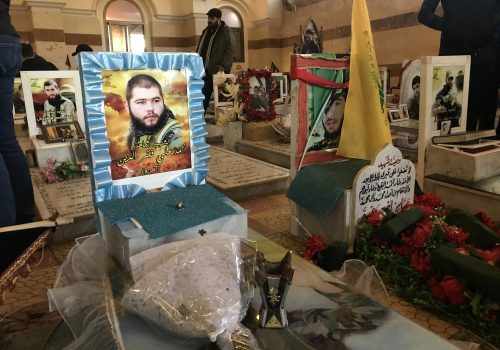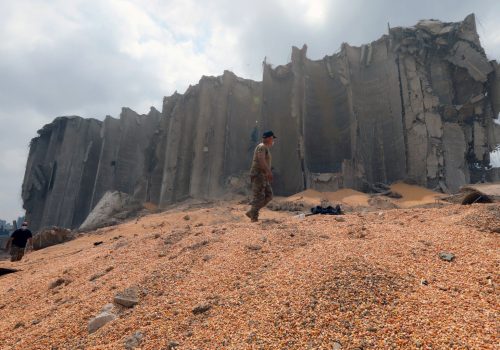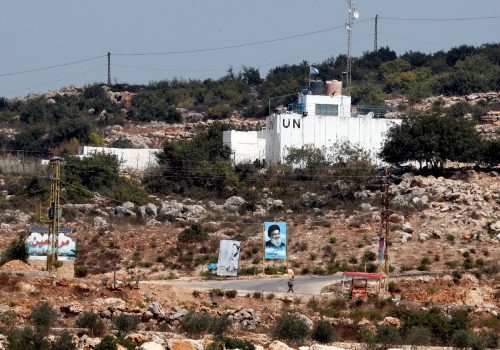Hezbollah walks tightrope between two opposing goals to deter Israel
In the first such incident since the 2006 Israel-Hezbollah War, Hezbollah militants launched a rocket barrage into Israeli-held Har Dov, also known as the Shebaa Farms, at 11:15 AM on August 6. Video released by Lebanese Hezbollah showed a rocket launcher mounted on an Isuzu Bongo truck firing twenty rockets into Israeli-held territory.
The Israel Defense Forces (IDF)—erroneously counting nineteen rockets fired—stated that the barrage had happened “before 11:00 AM” and that its Iron Dome missile defense system had intercepted ten of the projectiles, while six landed in open areas in Israel and three fell short in Lebanon. No injuries or damage were reported. Meanwhile, the IDF responded with artillery fire. Hezbollah soon issued a statement claiming responsibility for the attack.
On August 5, an Israeli airstrike in south Lebanon—targeting an open area from which rockets had been launched at Israel by unidentified militants in the third such incident since May 19—prompted Hezbollah’s rocket attack. The August 5 airstrike was Israel’s fourth aerial bombardment in Lebanon since the 2006 war and its second using fighter jets rather than drones. Each instance was a flagrant violation of the “rules of the game” that have prevailed since that conflict, and each was met with a response from the group to prevent Israel from unilaterally establishing new rules. Similarly, Hezbollah’s retaliatory rocket fire on August 6 was meant to reinforce those old rules, but also demonstrated the constraints that Lebanon’s domestic crises have placed upon the group.
In February, Israel’s Military Intelligence Directorate (Aman) released its annual intelligence estimate, stating that Hezbollah had accrued a “deterrence deficit” vis-à-vis Israel for failing to avenge the death of its fighter Ali Kamel Mohsen, who was killed in an Israeli airstrike on Damascus on July 20, 2020. At the time, the group vowed a revenge attack, which never came. That “deficit” grew when Israeli forces killed Mohammad Qassem Tahhan, a Hezbollah reserve fighter, on Lebanese soil as he attempted to break through the Lebanon-Israel border opposite Metulla on May 14. In his subsequent May 25 speech, Hezbollah Secretary-General Hassan Nasrallah stated his group was adding Tahhan’s “blood” to its account with Israel, but noted that his group would be “patient” in avenging its latest fallen “martyr.” Once again, Hezbollah’s patience seemed infinite.
However, the Israelis went a step too far with their August 5 airstrike. Hezbollah derives its durability from popular support, which, in turn, is partially dependent on the group’s perceived ability and readiness to confront Israel at any time. By striking in Lebanon, Israel had violated one of the group’s most serious redlines. Now, Hezbollah claiming that it was tormenting Israel through anticipation of a revenge attack—as it repeatedly did after Mohsen’s death—would not suffice to save the group from domestic accusations of impotence and would allow Israel to unilaterally create a new status quo. Hezbollah’s prompt retaliatory rocket strike was, therefore, all but inevitable.
Hezbollah’s retaliatory strike had several goals: first and foremost, to turn the proverbial page on the August 5 Israeli airstrike. Hence the swiftness of the group’s retaliation, its dramatic choice to fire rockets into Israel for the first time since 2006, and the accompanying propaganda (including its video of the attack), and a ready statement by its Deputy Secretary-General Naim Qassem, who was then visiting Iran. “Lebanon is an arena that is protected and guarded [by Hezbollah]… Israel must understand that it must remain deterred, otherwise we are ready to retaliate,” he said.
That ready-made propaganda package was meant, in turn, to dispel any potential doubts among its supporters that the resistance had lost the initiative vis-à-vis Israel. Indeed, Nasrallah and Hezbollah Executive Council Chairman Hashem Saffiedine both stressed that the group’s rocket attack had “reaffirmed the deterrence equation,” preventing Israel from striking in Lebanon with impunity or unilaterally changing the rules of engagement. They also suggested that Hezbollah alone was deterring Israel from even more grievous violations of Lebanese sovereignty and that Israel—in contrast to Hezbollah and its allies—was suffering from crippling political and social crises. Moreover, in contrast to Israel, they alleged the Resistance Axis was growing in strength and unity.
Lending credence to this claim of increased unity and strength, Hezbollah’s Resistance Axis allies—including Hamas, Palestinian Islamic Jihad, Ansarullah, and Kataib Hezbollah—had already congratulated the group shortly after the rocket attack. Furthermore, to stress that it had the proverbial last word in its exchange with Israel, Hezbollah issued a statement claiming that the “Zionist Enemy has not carried out any airstrikes nor fired a single projectile at the areas from which the Resistance’s rockets were fired”—a claim belied by the IDF and Lebanese media outlets, including a reporter for Hezbollah’s Al-Manar.
Hezbollah was also seeking to ensure that any deterioration of its “deterrence equation” with Israel—set back after its continued failure to avenge Mohsen and Tahhan—would not extend to its red lines on Lebanon. As a corollary, the group was also testing the limits of Naftali Bennett, Israel’s new prime minister. Bennett has already proven more aggressive than his predecessor Benjamin Netanyahu, retaliating with airstrikes against incendiary balloons launched from the Gaza Strip and now pushing Hezbollah’s limits in Lebanon. For now, the group seems to have reinforced its red lines with the new Israeli premier. However, it’s worth noting that according to one report, US pressure, and not Hezbollah, was the cause of Israel’s restraint, though Israeli sources denied this.
Still, one unintended consequence of Hezbollah’s August 6 rocket strike was to demonstrate the extent to which Lebanon’s ongoing crises are constraining the group militarily. During his August 7 speech, Nasrallah stressed Hezbollah’s leadership’s oft–repeated claim that the group isn’t seeking war, but is ready for it. And, yet, this was belied by Hezbollah’s recent rocket strike, which followed Aman’s February assessment almost to the letter—a “battle day” akin to Israel’s clashes with Gaza-based militants, but which rigorously avoided Israeli civilian or military targets and barely penetrated Israeli territory.
Indeed, even though this was the first instance of Hezbollah firing rockets into Israel for years, the group’s grandstanding—and the dramatic nature of the attack itself—masked the fact that the operation appears to have been “scrupulously planned,” according to Nasrallah, to avoid any Israeli casualties, military or otherwise. By Hezbollah’s own admission, the strike was meant to hit open areas. It was also conducted in broad daylight in a likely attempt to allow Hezbollah’s fighters maximum visibility, to ensure those open areas were vacant of Israeli troops prior to launching their rockets. In other words, it was meant to be a largely theatrical exercise, albeit one in response to an admittedly equally theatrical Israeli provocation.
Nasrallah tried to cover this in his August 7 speech, claiming that the group attacked in broad daylight to avoid a potential exchange of fire that would’ve frightened sleeping Lebanese locals, and that Hezbollah had targeted empty land as an “eye for an eye” retaliation. Nasrallah went further, claiming that, despite Hezbollah’s convention of naming revenge groups after the “martyrs” their attacks are avenging, last Friday’s strike wasn’t meant to close the account with Israel over Mohsen and Tahhan. “Our goal was to kill an Israeli soldier in exchange for killing our brother,” he said, but dubiously claimed the group couldn’t locate any for months, because they were all hiding.
This begs the question: why not do it now, when an allegedly crisis-ridden and existentially fearful Israel had crossed the last of Hezbollah’s redlines? Nasrallah claimed that, unlike with the airstrike on an empty field, “time is not of the essence” when avenging fallen fighters. But the real answer likely lies elsewhere—perhaps not in fear of the IDF per se, but in Hezbollah’s real fear that Lebanon, abandoned by all its traditional benefactors, will not be able to recover from the destruction promised by Israel in a future war.
Indeed, this very domestic constraint was on full display when locals in south Lebanon’s Shwaya seized Hezbollah’s rocket-launching truck as it was returning from its mission. In and of itself, the incident was neither unprecedented nor significant. Nasrallah’s subsequent insistence on restraint, calm, and confining anger to the perpetrators themselves—rather than all of Shwaya—was telling. The group is walking a tight rope between two opposing goals: keeping an increasingly aggressive Israel at bay while avoiding compounding Lebanon’s crises with security conflagrations or domestic strife.
David Daoud is a nonresident fellow at the Atlantic Council. He is also a research analyst on Lebanon and Hezbollah at United Against Nuclear Iran (UANI). Follow him on Twitter: @DavidADaoud.
Image: A member of Lebanon's Hezbollah holds a Lebanese flag during a ceremony marking the first anniversary of the killing of senior Iranian military commander General Qassem Soleimani and Iraqi militia commander Abu Mahdi al-Muhandis in a U.S. attack, in the southern Lebanese village of Khiam, near the border with Israel January 3, 2021. REUTERS/Aziz Taher


